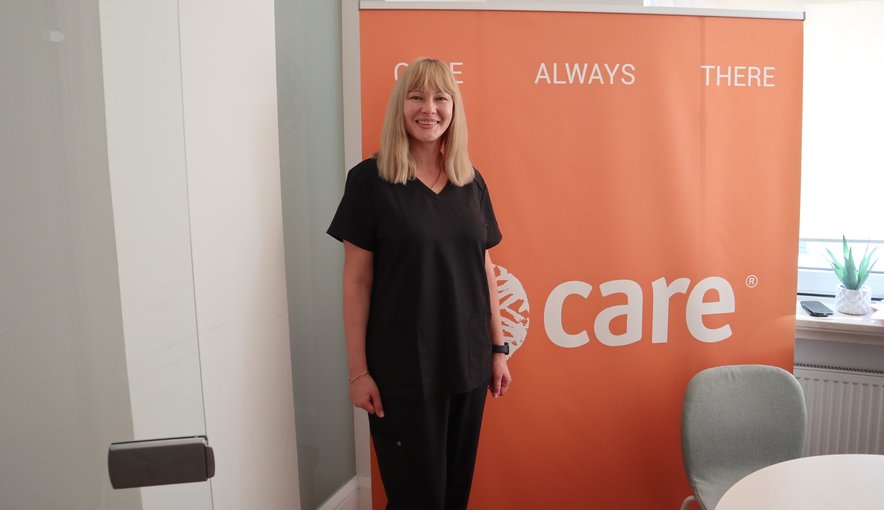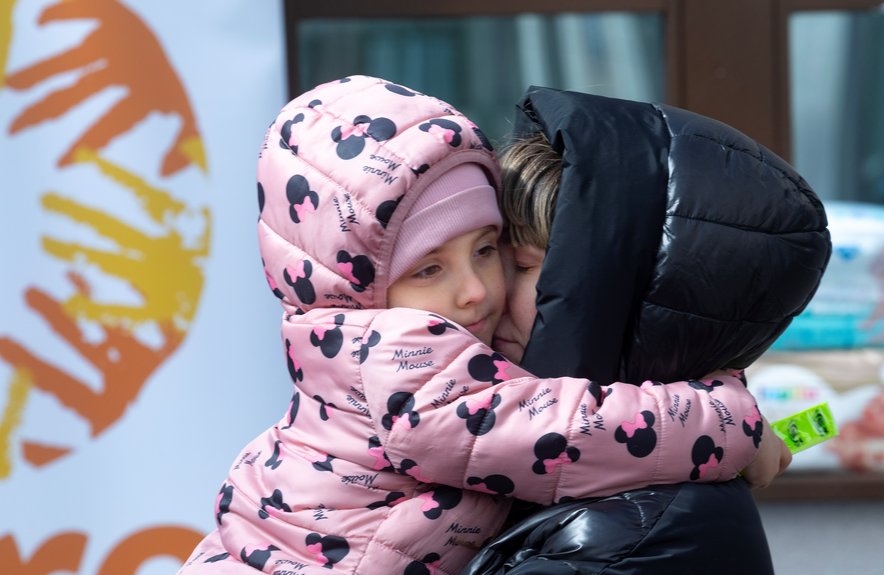In a small, sunlit room filled with warmth, Tetiana sits at a table - tired, yet smiling. She is a 50-year-old woman who has just returned from a 24-hour shift at a care home for older people, where she now works as a nurse.
It has been nearly two years since Tetiana arrived in Poland with her daughter. At first, everything felt different — the language, the laws, the culture. But today, thanks to the support she received along the way, Tetiana is rebuilding her life, making plans, and dreaming again.
Tetiana is a refugee from Ukraine. And after ten years of fleeing war and searching for safety, she’s finally beginning to feel at home.
Forced to flee within Ukraine
She left her hometown Makiivka in Donetsk region in 2014, when the war in Ukraine began. Back then, it felt temporary – a short trip with her five-year-old daughter and her mother to visit relatives in Zaporizhzhia. "Just for a few weeks," she thought at the time. But the war didn’t end. Weeks turned into months, and the hope of returning home faded. Tetiana had to leave behind her job, her home, and everything familiar.
For eight years, she lived in Zaporizhzhia. But in early 2022, the full-scale invasion forced her to move once again.
“Just like in 2014, I didn’t believe it would last long. There were no explosions yet — just sirens, power outages, and fear. I thought it would pass. I wasn’t ready to leave again.”
But in March, when Russian troops took control of the nearby nuclear power plant in Enerhodar, the threat became critical. With the help of friends, Tetiana and her daughter escaped to a small village in western Ukraine.
“For a while, I felt safe again. The mountains, the quiet, no military targets nearby. But five months later, war caught up with us there too”. Late at night, three powerful explosions shook the house. Tetiana recalls:
I grabbed my daughter, our two cats, and headed for the train station."
Escape to Poland
Not knowing where to go, Tetiana boarded the first bus to Przemyśl, Poland. From there, they took a train to Warsaw.
“I found a temporary housing programme online, and we were given shelter for three weeks. It was hard. I didn’t speak the language. But wherever I went, I met kind people willing to help.”
Tetiana enrolled her daughter in a Ukrainian school and, within a few months, began working as a nurse in a care home. The Polish government allowed Ukrainian medical staff, including nurses, to a receive conditional permit to work for five years without formal recognition of their qualification, giving them time to learn the language and verify their qualifications.
But it wasn’t easy. Money was tight. Finding housing was difficult. “I remember the night we had to sleep in a tent in the refugee centre. I was terrified – I had never experienced anything like that. But I met other women like me. And I realised I wasn’t alone.”
Rebuilding skills and confidence

Tetiana started slowly rebuilding her life after displacement. But she knew that to truly feel confident in a new country, she needed more than resilience – she needed recognition of her skills.
Her Ukrainian diploma as a junior healthcare specialist, unfortunately, couldn’t be formally recognised in the EU. The only path forward was to start anew — and pursue a full bachelor's degree at a Polish medical university, a journey that would take at least three years.
That’s when Tetiana found out about CARE’s support programme for displaced Ukrainian healthcare workers. She applied — and was selected from nearly 700 applicants.
CARE helped cover the cost of her first year of study, standing by her side at the beginning of this long process. Now, with new confidence and a renewed sense of purpose, Tetiana is continuing her studies – and moving one step closer to returning to the profession she loves.
Daring to dream for the future
“For me, it’s not just about a job. It’s about confidence in the future,” she says.
“CARE’s support has been life-changing. Language courses, financial support for upskilling, informational guidance and mentorship, simply being heard – it helps you feel that you matter.”
Recently, CARE Poland and other NGOs published the report “Qualifications Beyond Borders: Recognition of Ukrainian Diplomas and Qualifications in Poland,” which explores the challenges faced by refugee professionals.
In the meantime, small acts of support allow people like Tetiana to dream again. Her daughter will soon enter university, with the chance to work anywhere in the world. And Tetiana is on her way to finally receiving official recognition of her nursing degree.
“Maybe someday I’ll have a little flower bed under my window,” she says with a smile. “Something of my own. Something that stays.”
How you can help refugees from Ukraine

More than 6 million people like Tetiana have fled their homes in Ukraine, leaving behind jobs, belongings and loved ones.
CARE and our partners are providing aid to refugees and displaced people in Ukraine, Poland, Romania, Germany and Georgia. Thanks to your support, we have been able to reach over 1.2 million people affected by the crisis since February 2022.
Please donate today so that we can help provide:
- Education
- Health services
- Accommodation
- Cash assistance
- Emergency food
- Safe water and sanitation



